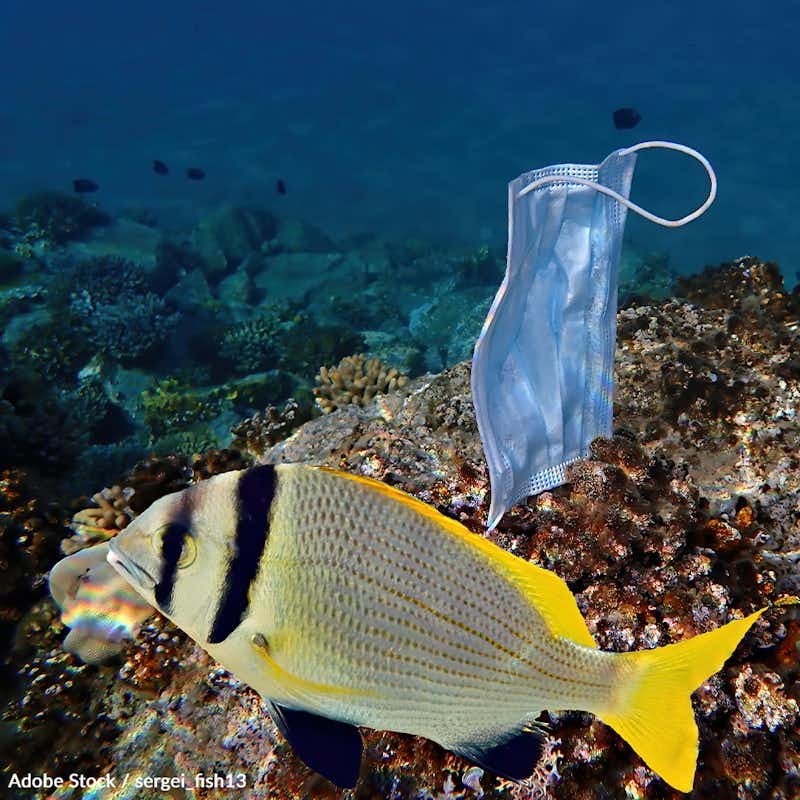Reduce Disposable Mask Waste And Protect Our Planet
6,489 signatures toward our 30,000 Goal
Sponsor: The Rainforest Site
Help mitigate the impact of disposable face mask pollution and protect our environment for future generations. Take action and spread the word!

The COVID-19 pandemic has brought about many changes to our daily lives, one of which is the widespread use of face masks to prevent the spread of the virus. However, as the pandemic continues, the discarded face masks are becoming a growing environmental scourge1.
One of the main concerns is the impact on land. Discarded face masks, along with other forms of personal protective equipment (PPE), are commonly found littering streets, parks, and other public spaces2. These discarded masks can take hundreds of years to degrade and can harm many forms of wildlife. They can also clog drains and sewers, leading to flooding and other environmental problems3.
The problem is not limited to land. Face masks, along with other forms of plastic pollution, are also finding their way into our oceans and rivers, where they can harm marine life and damage fragile ecosystems. Plastic debris in the ocean can take hundreds of years to degrade and can be mistaken as food by marine life, leading to starvation and death4.
One of the most concerning impacts of disposable face mask pollution on wildlife is the harm caused by ingestion. Birds, marine mammals, and other animals may mistake discarded face masks for food and ingest them, leading to starvation, suffocation, and even death. In some cases, the masks can also become entangled in the animals' jaws or other body parts, causing injury or death5.
For example, In recent years, there have been several cases of sea turtles being harmed by disposable face masks. Another problem caused by face mask pollution is the entanglement of wildlife in the lanyards or earloops of the face masks, particularly in marine mammals and birds, which can cause suffocation, drowning or injury6.
In addition, the face mask pollution can cause damage to the habitats of wildlife, for example, the pollution can smother coral reefs and harm other forms of sea life7.
The situation is particularly dire in countries with inadequate waste management infrastructure. In many developing countries, face masks and other forms of plastic waste are often not properly disposed of, leading to widespread pollution of land and sea. This not only harms the environment but also poses a health risk to local communities8.
One solution to this problem is to encourage the use of more sustainable alternatives to disposable face masks. Reusable cloth masks, for example, can be washed and used multiple times, reducing the amount of waste generated9. Additionally, governments and other organizations can invest in more robust waste management infrastructure, particularly in developing countries, to ensure that face masks and other forms of plastic waste are properly disposed of.
Another solution is to encourage individuals to properly dispose of their face masks and other forms of PPE. This can be done by providing more education and awareness about the environmental impact of discarded face masks and by providing more convenient and accessible disposal options.
Take the pledge to reduce disposable face mask pollution both at home and around the world.
- United Nations (30 July 2020), "Five things you should know about disposable masks and plastic pollution."
- Laura Parker, National Geographic (14 April 2021), "How to stop discarded face masks from polluting the planet."
- James Ashworth, Phys.org (11 August 2022), "Discarded pandemic face masks could harm wildlife for years to come."
- World Economic Forum (2 November 2018), "This is how long everyday plastic items last in the ocean."
- Anne Pinto-Rodrigues, ScienceNews (12 April 2021), "Discarded COVID-19 PPE such as masks can be deadly to wildlife."
- OceansAsia (7 December 2020), "COVID-19 Facemasks & Marine Plastic Pollution."
- Manikanda Bharath K, International Water Association (22 July 2021), "Are face masks a threat to oceans?"
- Kutoma Wakunuma, The Conversation (22 October 2021), "Plastic waste is hurting women in developing countries – but there are ways to stop it."
- Yacob T. Tesfaldet, Nji T. Ndeh, Science of the Total Environment (4 January 2022), "Assessing face masks in the environment by means of the DPSIR framework."
The Pledge:
I understand that discarded face masks are becoming a growing environmental scourge, can take hundreds of years to degrade and can harm many different species on land and sea.
As such, I pledge to
- Properly dispose of disposable masks
I pledge to place use disposable masks in a sealed bag and throw them in the trash, not be thrown on the ground, in the ocean, or in other bodies of water.
- Use reusable masks
I pledge to switch to reusable masks, which can be washed and used multiple times, reducing the amount of waste generated.
- Support sustainable alternatives
I pledge to support sustainable alternatives by purchasing masks made from sustainable materials, supporting companies that use sustainable production methods, or promoting the use of sustainable alternatives to disposable masks.
- Educate others
I pledge to educate others by spreading awareness about the environmental impact of disposable masks and encouraging others to take steps to reduce their own impact.
- Support waste management infrastructure
I pledge to support organizations working on the ground to improve waste management infrastructure in those areas.
By taking these steps, I will help mitigate the impact of disposable face mask pollution and protect our environment for future generations.
Pledged by,